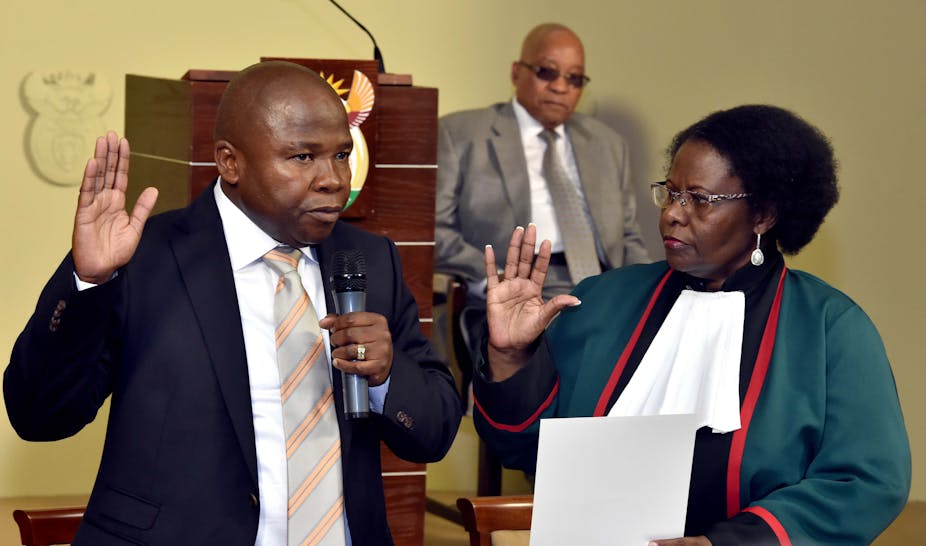South African President Jacob Zuma’s decision to replace a finance minister who was widely respected with someone who is unknown has raised questions about his political acuity as well as his style of leadership. Thabo Leshilo, politics editor of The Conversation Africa, asked Mashupye Herbert Maserumule and Danny Bradlow for their views on the issue.
What does the president’s decision tell us about how he runs the country?
Mashupye Herbert Maserumule: The President cannot be faulted on constitutional grounds. He is empowered by the Constitution to decide on the composition of his cabinet.
But his decision appears to be strategically flawed. Nene had the kind of leadership talent the president needs in his cabinet. Simply removing him in the way he did raises a question about the strategic ingenuity of the decision and the need to build the capacity of the state.
The president’s decisions, particularly in key areas such as mining, and finance, are strange. This is particularly true given that some ministers he has moved had issues with people said to be connected to him in one way or another. An impression can easily be created that the president’s way of running the country has begun to border on vindictive leadership.
The fact that he did not consult the leadership of the ruling African National Congress (ANC) about firing the finance minister raises interesting questions. Consulting the ANC is not prescribed in the Constitution. In the end, it does not matter what the ANC says. The composition of cabinet is the president’s call. If anything, consultation is about party political protocol, or mere courtesy.
Not consulting party headquarters does not necessarily make Zuma a liability to the country. He only becomes a liability when his decisions are at odds with what is in the public interest.
Perhaps the issue is the amount of power the Constitution assigns to him to make the decisions about his cabinet. This needs to be looked into seriously because it has profound implications for the quality of South Africa’s democracy and system of governance.
Danny Bradlow: The failure to provide a convincing rationale for the firing and not to announce what Nene is doing next undermines confidence in governance in South Africa. It suggests that personal considerations rather than national interest are driving policy decisions. This will adversely affect South Africa’s international position.
This action by the President makes it hard not to be pessimistic about the South African government’s ability to manage the difficult challenges the country is likely to face next year.
How do you explain Zuma’s decision given the fact that South Africa faces a challenging economic environment?
Mashupye Herbert Maserumule: The country is already being punished for the president’s decision. Rating agencies are poised to downgrade it to junk status. In this instance the issue is not just about Nene’s removal, but the implications of who he has chosen as the new finance minister.
Questions are already asked. For example, does the market recognise him? Unfortunately the answer is: not yet. By removing Nene the president disrupted consistency of leadership succession in the National Treasury which had been established successfully and meticulously over a period of time.
Danny Bradlow: It is hard to think of a worse time to fire a finance minister who has been doing a very credible job under difficult circumstances.
In Africa, South Africa is increasingly being seen as relatively less reliable and important as an interlocutor. Other African countries are growing in power and prestige. For example the Chinese are paying increasing attention to East Africa and many states are paying more attention to Nigeria than they used to.
As a result, for the first time in many years, South Africa risks being seen as a relatively small, uninteresting country with diminished capacity to influence global affairs or the global economy. In other words, a country that does not matter.
This is the seventh cabinet reshuffle the president has made since he came to office in 2009. He is on record as saying that the ANC, not the country, comes first. What do his appointments tell us about his priorities?
Mashupye Herbert Maserumule: The president’s appointments appear to be more inclined towards political expediency than the interests of the country. Cabinet reshuffles are normal. But if they are frequent they can have a destabilising effect on the administration of the state, especially if they are for vindictive reasons.
In these trying times South Africa desperately needs stability in government and political executive leadership of epic proportions, with unflinching commitment to good governance.
Danny Bradlow: I think it is the most disturbing development in SA this year. It undermines confidence in the government’s commitment to prudent macro-economic policies and in its understanding of the gravity of the economic challenges facing SA.
The way in which it has been done sets the new minister up for failure regardless of his skills and qualifications. He now has to try and gain the confidence of all the relevant stakeholders including investors, business, labour, the country’s neighbours and trading partners. And he has to do this in a situation that is fraught with uncertainty and in which confidence in the authority of the Treasury is shaken and stakeholders have serious questions about the reasons for his appointment.

